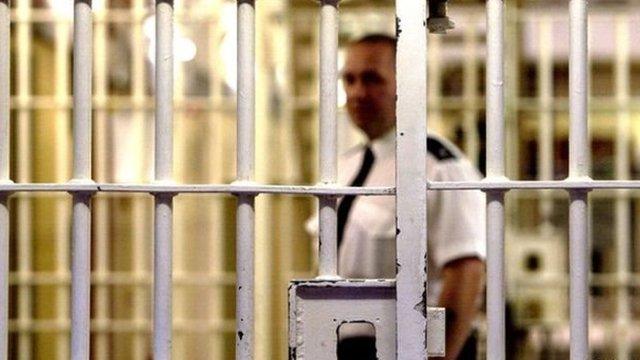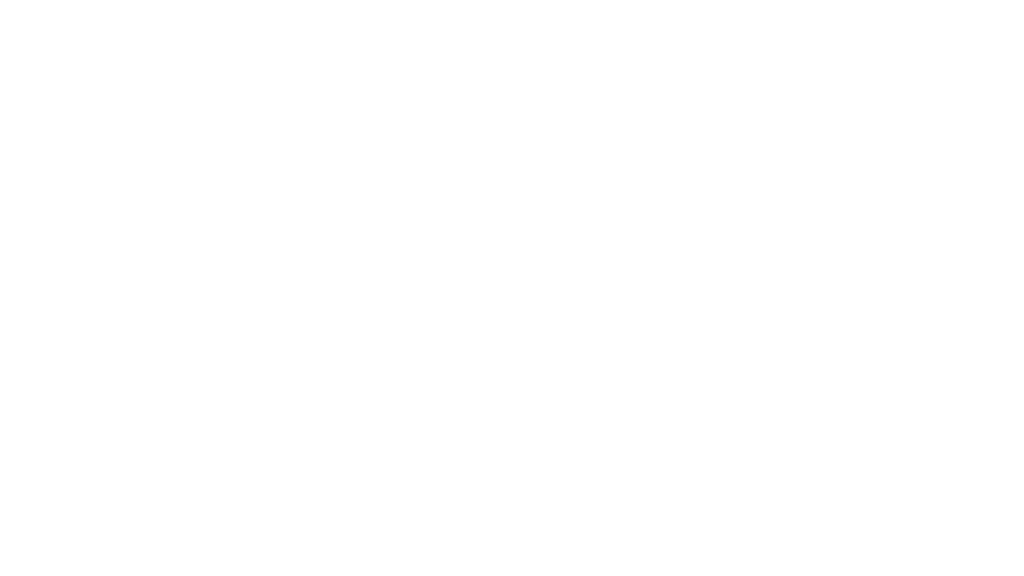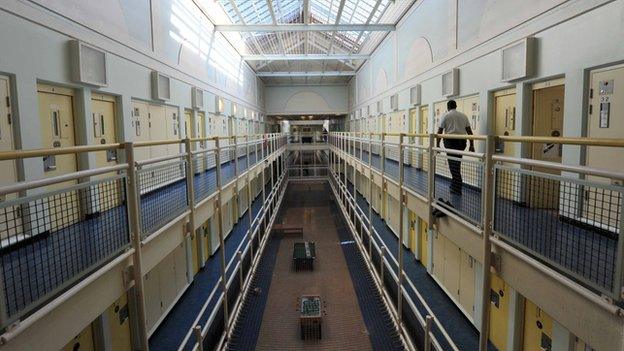Gove: I want to reduce prison numbers in England and Wales
- Published

Mr Gove said he wanted to see more effective rehabilitation of prisoners
Justice Secretary Michael Gove has said he wants to reduce the prison population in England and Wales.
Addressing the Howard League for Penal Reform's conference, Mr Gove said he hoped numbers would "fall over time".
He also indicated there could be major reforms to sentencing - but added that he did not want to "leap to any conclusions".
The use of body-worn cameras, currently being trialled, would improve prison staff behaviour, he also said.
"If prison officers are wearing body-worn cameras, that does mean they're less likely to be assaulted.
"It also means that they are more likely - and I don't think that this is as much of a problem as it was 20 years ago - but it also means that any individual prison officer is more likely to behave appropriately and decently as well", he told the central London conference.
'Effective rehabilitation
The justice secretary was directly asked by a panel member whether the prison population, currently 85,000, needed to be cut.
He replied: "Obviously I'd like to see the prison population fall over time.
"I believe the best way we can do that is by dealing effectively with those offenders who are in our care at the moment, through effective rehabilitation."

Analysis by Danny Shaw, Home affairs correspondent
Like his predecessor, Chris Grayling, Michael Gove does not like to use the word "crisis" to describe the state of the prison system.
Nevertheless, he was remarkably frank about the "deeply concerning" problems in jails - highlighting rising levels of violence, high self-harm rates, poor sanitation in some establishments, lack of purposeful activity, drug misuse and staff corruption.
Unlike some of those who've held the prison brief before, Mr Gove spoke openly about his desire to reduce the jail population. This is significant.
It confirms the change in direction in crime and punishment policy, described by the justice secretary as "a new era"; it sends a message to magistrates and judges to explore alternatives to custody, where possible; and it prepares the ground for sentencing reform, possibly next year, which might see fewer people locked up.

Mr Gove's remarks echoed David Cameron's comments at the Conservative Party conference last month, in which the prime minister called for an end to the sterile "lock 'em up or let 'em out" debate.
The justice secretary said he wanted to "transcend the old divisions that used to bedevil the debate".
BBC home affairs correspondent Danny Shaw said that in recent years government minsters had tended to shy away from answering questions about wanting to reduce prison numbers, worried that they could appear "soft" or that their aims would not be achieved.
'Sensitive' regime
Mr Gove also indicated that there could be major reforms of sentencing.
"We do need to look at our whole sentencing framework," he said, adding that he did not want to "leap to any conclusions".
He said more research was needed on the effectiveness of sentencing before devising plans as to how a "more sensitive" regime could be achieved and said it was "worth analysing" the impact of short sentences.
Other options ministers are understood to be looking at include greater use of electronic tagging as an alternative to imprisonment, and reducing the number of inmates who are recalled to jail for beaching the terms of their release.
The Howard League conference was also told about the justice secretary's plans to give prison governors more control and the sell-off of older prisons, which he said had support at the "heart" of government.
- Published26 October 2015
- Published22 October 2012

- Published14 July 2015
